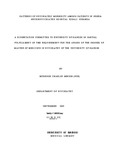| dc.description.abstract | introduction: According to the World Health Organization (WHO), mental health is defined as
an essential and integral part of health as a whole.
The 1994 war and Genocide, which took place in Rwanda, left many people physically and
psychologically traumatized. This led to an increment in psychiatric disorders within the country.
However, few studies have been done to assess the prevalence of psychiatric morbidity in the
country.
Objectives: To determine the socio-demographic variables of mentally ill patients, determine the
source of referral of the patients, determine the duration of hospital stay, to determine patterns of
psychiatric morbidity and the assigned clinical diagnosis, to determine relationship between
socio-demographic variables with psychiatric morbidity.
Methods: Study design was Cross-section descriptive study.
Settings: The study sample came from Ndera Neuropsychiatric Hospital Kigali -Rwanda.
Systematic and consecutive sampling by choosing every 3,d patients was employed, 384 patients
meeting the inclusion criteria were interviewed using Socio-demographic questionnaires and
SClD-l for DSM-IV TR diagnosis. Data was analyzed using the Statistical package for Social
Sciences (SPSS) version 12
Results: Three hundred and eighty four patients participated in the study. And 58% percent were
males. Majority of these patients were aged between 21 and 30 years. And 51% Fifty one percent
were single. The highest level of education was primary (44%). Majority of the patients were
unemployed earning less ten US dollars per month. In this study population, majority were
Protestants comprising of (45%). As regards to the province of origin, majority of the patients
came from Kigali town (46%). Forty three percent had a family history of mental illness. Night
five percent were admitted involuntarily and 70.3% were referred by relatives. More than 46% of
the patients had been admitted more than two times and majority stayed in the hospital for more
than two weeks (35%). Schizophrenia, mania, major depression, brief psychosis, cannabis, acute
psychosis, Post-traumatic stress disorder and alcoholism in order of priority, were the most
commonly assigned clinical diagnosis. Twenty eight percent of patients had no defined clinical
diagnosis. Structured clinical interview for DSM-IV Axis I disorders clinical version (SCID-I)
showed th'at Schizophrenia was the most frequent diagnosis (39.3%), followed by current manic
episode (38.5%,) Depressive episode (8%), Substance abuse (6.7%) and Post-traumatic stress
disorder (5.2%) , least being Acute stress disorder and generalized anxiety disorder (1.3%) and
(0.7%) respectively.
There was a difference between assigned clinical diagnosis and structured clinical interview for
DSM-IV diagnosis where (SCID-I) picked more Psychiatric morbidity compared with assigned
clinical diagnosis. There was some variation in the number of patients assigned clinical
diagnosed of current manic episode and SCID-I diagnosis accounting for 83 while that of
schizophrenia was 51 patients The SCID- I is therefore more precise in making diagnosis.
Relationship between severe Psychiatric disorder and Socia-demographic variables
Schizophrenia and Gender; (males, n=93, 6l.5%, p = 0.0178, x2=l.456), Marital status
(unmarried, n=99, 65.5%, p =0.001, x2=1.456), level of education (primary, n=81, 53.6%,
p=0.046, x2=10.411) and Occupation (informal, n=135, 89.4%, p = 0.002, x2=11.801)
xii
Current manic episode Gender; (males, n=85, 56.2% p= 0.014, X2= 0.128), Marital status
(unmarried, n=98, 66.2%, P= 0.014, x2=8.826), level of education (primary, n=83, 56.0%,
p=0.049, x2=4.l34)
Occupation; (informal, n=126, 85.1%, p =0.001, x2=8.542). Income per month in USD (below 40
0=107,72.2%, p= 0.020, x2=9.531)
Depressive episode; Gender (female n=24, 77.4%, p = 0.036, x2=17.118), Marital status
(females, n=21, 67.7%, p=0.042, X2 =6.432), Income per month (P = 0.002), Occupation
(informal n=26, 83.8%, P =0.036, X2=19568) and province (Kigali, n=11, 35.4%, p = 0.046,
x2=4.082).
. -- PTSD; Gender (female, n=17, 65%, p = 0.025, X2=0.528), Marital status (unmarried, n=17, 85%
p = 0.032, X2 =4.886) and occupation (informal n=15, 75%, p = 0.04, X2=3.533)
Conclusions: The study revealed different types and patterns of Psychiatric morbidity in Ndera
Neuropsychiatric Hospital, Kigali-Rwanda. This confirms the alternative hypothesis, which
states that there are variations in patterns of different Psychiatric disorders among patients in
Ndera europsychiatric Hospital.
SCID- I diagnosis picked more Psychi atric disorders s compared to assigned clinical diagnosis
raising the question of subjective Clinician impression. Majority of the patients were admitted
involuntary and were referred by relatives. The following Socio-demographic variables; Gender,
Marital status, occupation, Income per month, and Level of education and province of residence
were statistically significant and were related to a diagnosis of severe psychiatric disorder with P
value ≤ 0.05.
Recommendations: -There is need to; train hospital physicians, psychologists, and nurses on
how to use specific structured diagnostic instruments such as the SCID-I which is a precise
diagnostic tool for psychiatric disorders and also to strengthen family support in caring for
mentally ill patients in the community.
-A further study to determine psychiatric morbidity in general population is recommended as a
future project. Conduct a study on how best the low levels of substance abuse can be maintained.
Study limitations: -The first limitation was language; it was challenging to translate some
scientific words to fit the local dialect during the interviews.
-The interview were based on information at the time of admission and therefore some patients
could not recall all the details, regarding the past events. | en |

